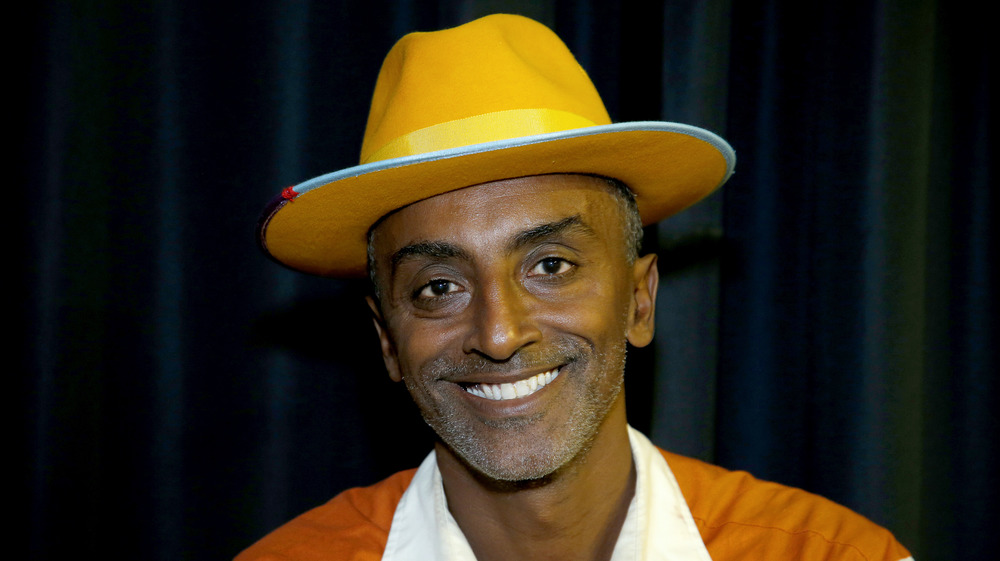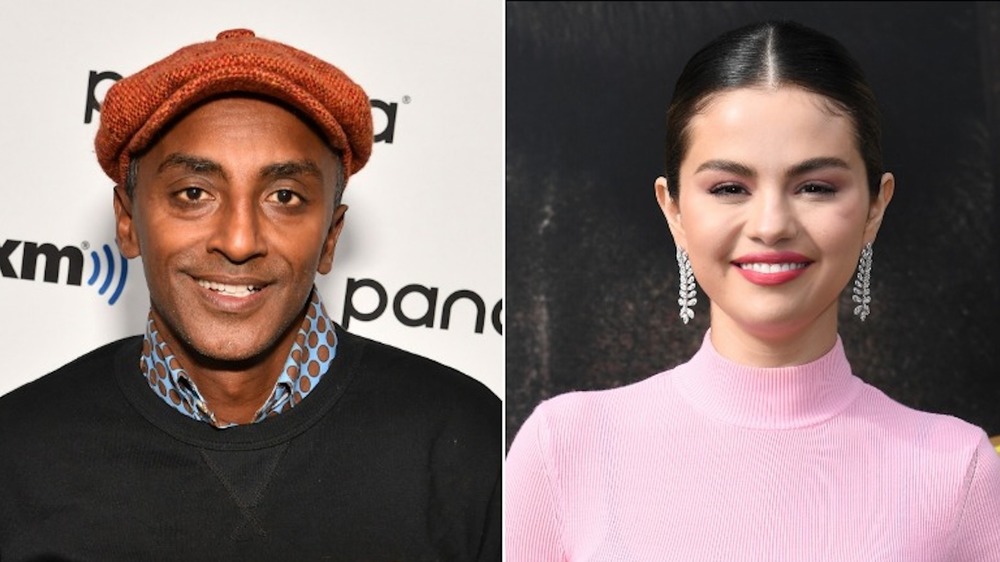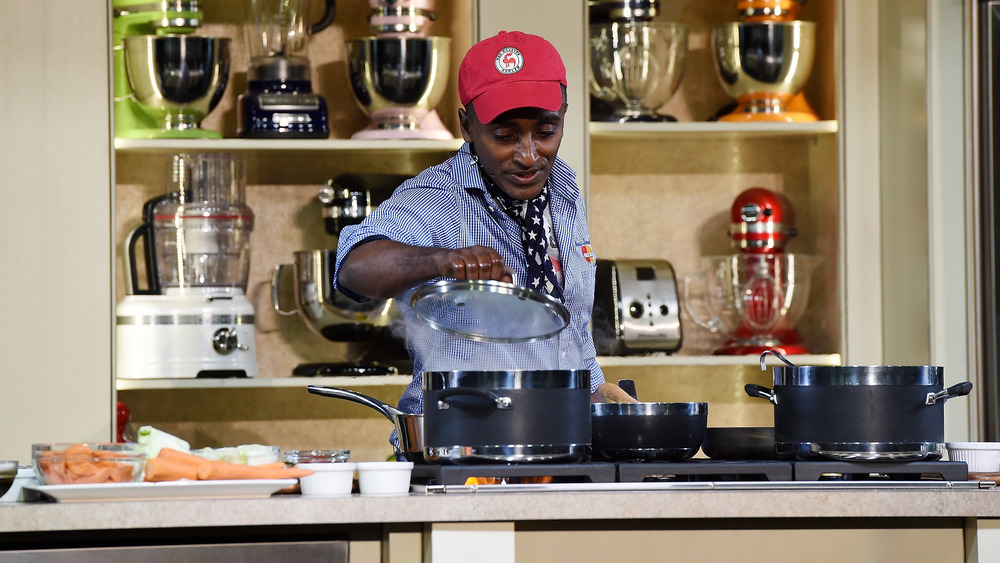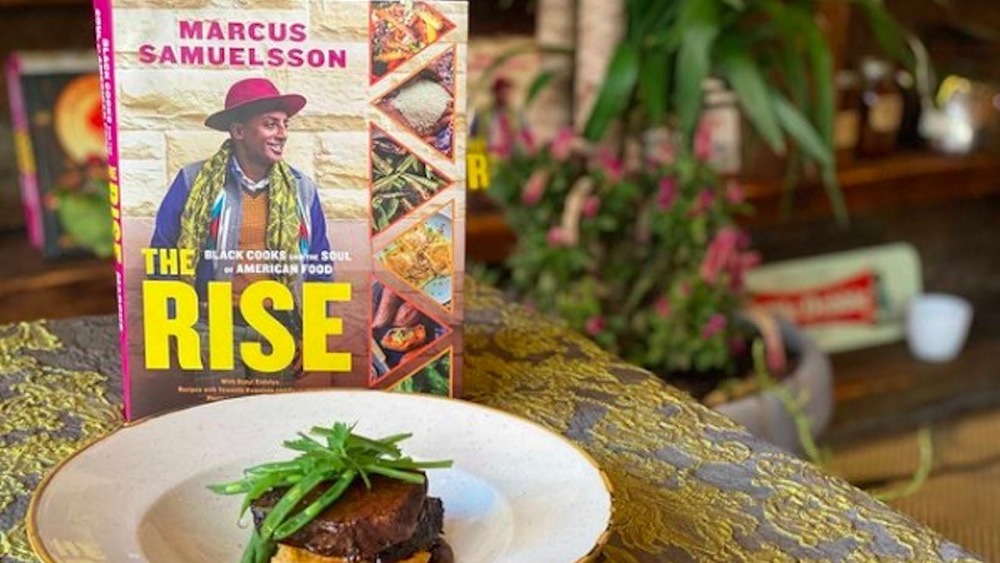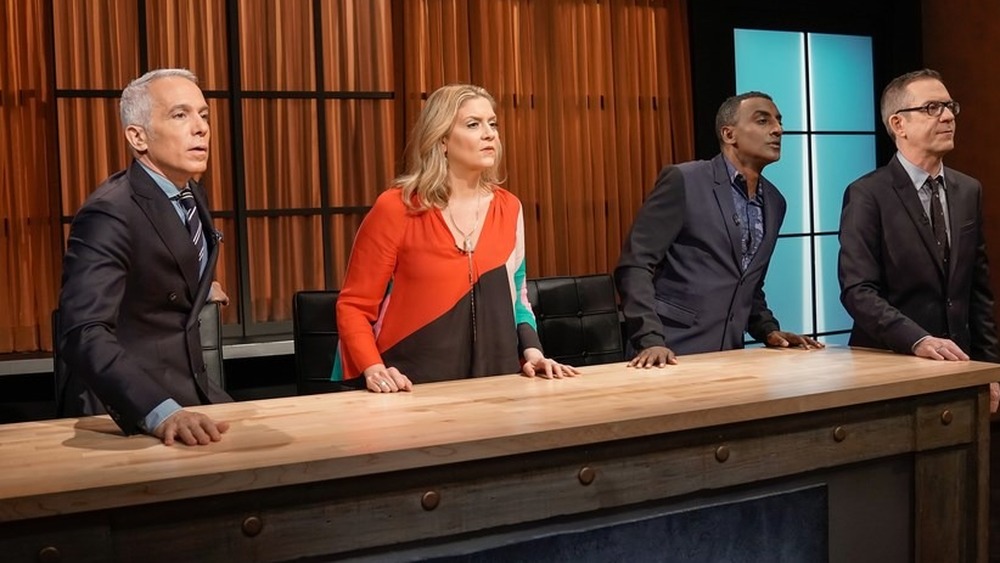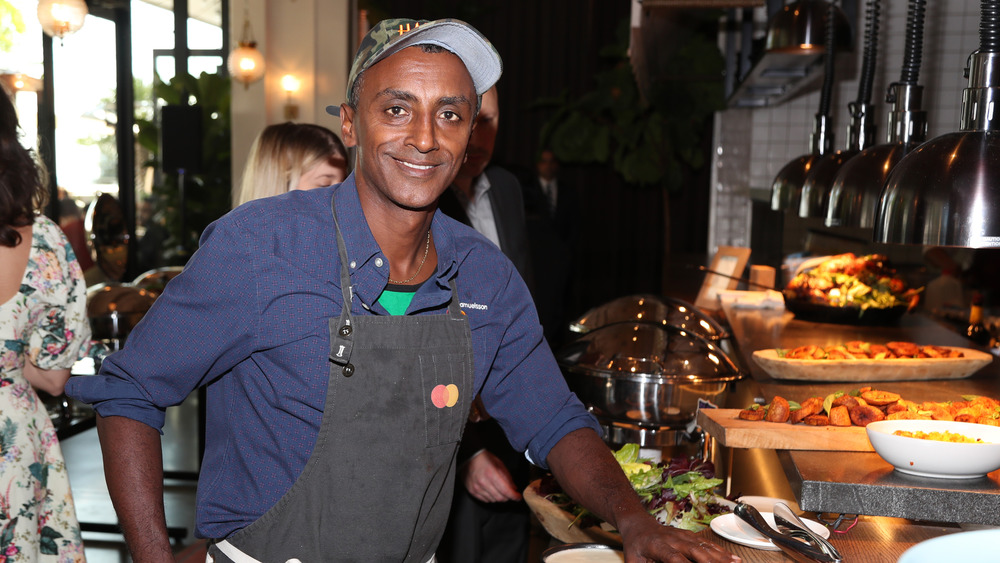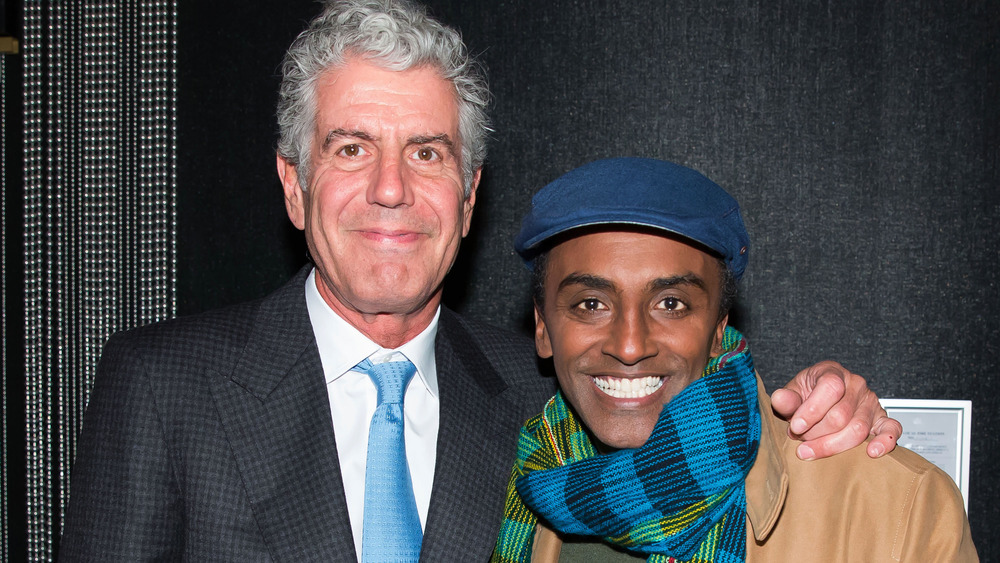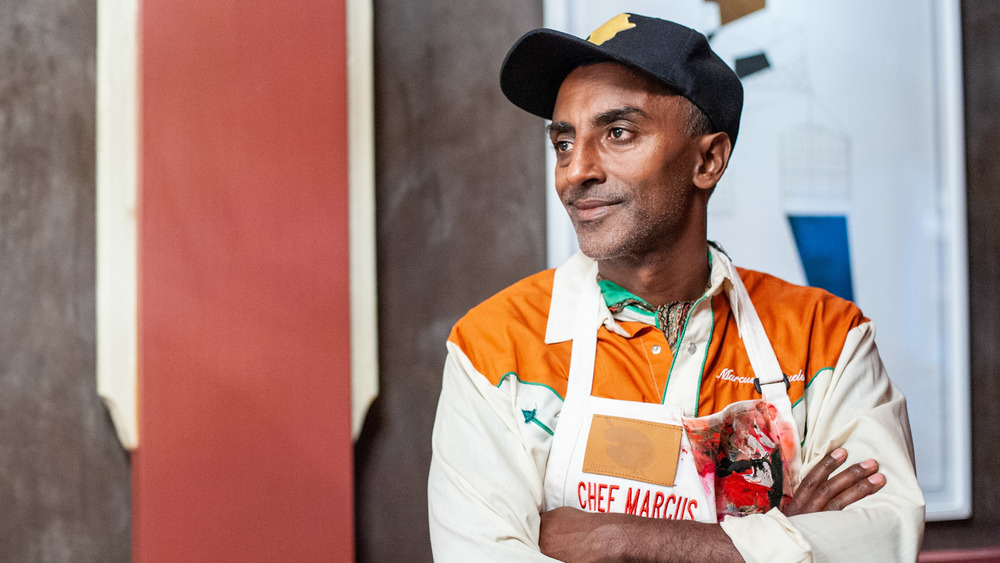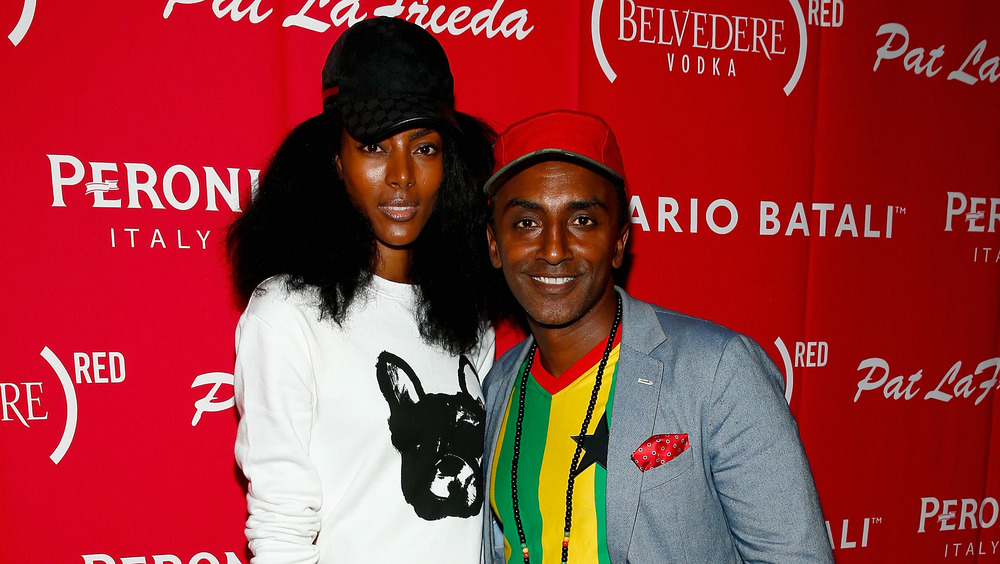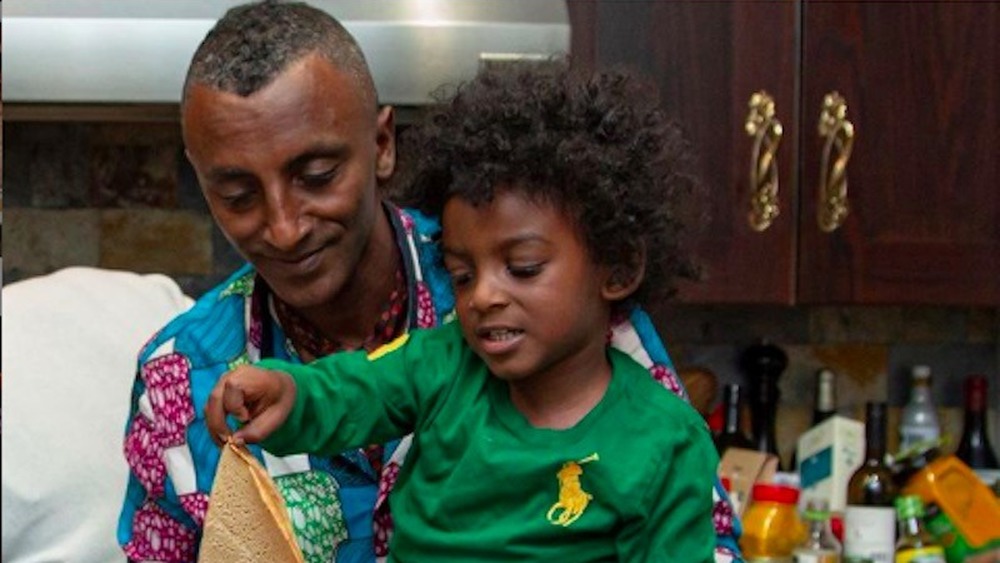Chef Marcus Samuelsson Talks Selena + Chef, New Cookbook, Pandemic Cooking, And More - Exclusive Interview
Like many of us during the COVID-19 pandemic, Chef Marcus Samuelsson is passing the time in the kitchen. The acclaimed author, restaurateur, philanthropist, and Food Network personality was busy in 2020 launching his newest cookbook, The Rise: Black Cooks and the Soul of American Food, while feeding thousands of New Yorkers from his Harlem restaurant Red Rooster. He also made some time to whip up a meal with actress and singer Selena Gomez for an episode of her HBO show Selena + Chef.
Samuelsson, an immigrant who was born in Ethiopia and grew up in Sweden, is determined to promote and honor his unique heritage in everything he does. And he's no stranger to hard work, both in and out of the kitchen. When he's not judging Chopped and running a dozen restaurants, Samuelsson also juggles his time between various TV projects, and working with numerous charitable organizations, including Unicerf, C-CAP, and City Harvest.
Mashed recently caught up with chef Samuelsson to talk about the latest highlights in his accomplished career. Samuelsson dished on working with Selena Gomez, launching his latest cookbook, what it's like judging Chopped, and more. He also shared his hopes for the future of American food culture, one which finally recognizes the important role that Black and immigrant chefs have played in our history and at our tables.
Marcus Samuelsson on teaching a virtual cooking class with Selena Gomez
You've cooked with a lot of people, but what was it like working with Selena Gomez?
Well, it wasn't just Selena. It was her grandparent and her best buddy, as well. So it was an all-family affair, but it was a lot of fun. She definitely wants to learn. She wants to have fun doing it. And with her Texas background, she knows good food.
And we had fun. We were laughing a lot. Cooking is great because it opens up for a long conversation and having fun. And it was definitely a lot of back and forth.
How would you say Selena did in the kitchen this time around?
I think she did well. I mean, she was game for anything. She wanted to try out stuff. It wasn't an easy recipe. You got to take the bones out of the fish. We cooked the stock. You got to strain it. It was layered and complicated, but I knew that it was worth the journey, because it's delicious, right? And just getting her over the finish line, I knew once she would eat it with her friends and family, I knew it'd be great. And she, I got to give her a lot of credit. She chopped, she took out bones, she brushed a glaze on, she seared. She did everything.
No pan fires this time around?
No fire this time, but there were some very close calls. Some steaming... I think we gave her a facial when she had to... pour the broth out of the fish. It was fun. It was a lot of fun to cook with her, actually. She was up for anything, so it was great.
Well, I know you mentioned fish. Can you tell me a little more about the dish that you chose to cook with Selena, and why you chose that one?
Well, I mean, I wanted to cook something that, show or no show, that this is something that she would put into her repertoire. I was thinking a lot about her traveling, being in front of millions of fans across the world. This is a dish that she can make, or if she travels with a chef... this is healthy, but it's also delicious, right? So doing that salad with lots of flavors in it, with fruits and herbs, all of that is very herbaceous and delicious. And then just searing that piece of fish. It doesn't have to be salmon, it can be any fish with a little bit of glaze on. So there were some steps there that were outside of her comfort zone. But flavor-wise, it's a very homey, delicious recipe.
Watching the show, it makes it seem like it's difficult to learn cooking via a virtual cooking class or Zoom, but from your perspective, what is it like teaching cooking on Zoom and remotely?
Well, it's also like at some point you just want to go in there and be like, move, I'll do it. You know what I mean? But you can't do that, literally, I'm in New York and she's in LA. But there was a couple of times like, ah, I just wish I was like, ah, let me go in there.
But then also I think for her, it's fun too. Because obviously she's such a leader. She's been in front of us for so many years, right? And you don't get to that position, you don't have [close to] the most Instagram followers in the world without being a leader and a driver. So for her to constantly have chefs screaming in our ear what to do, you know what I mean? It's like, I know what I'm doing.... We had a blast and I just wish I could be there at certain moments just to help her out a little bit, but I don't think she even would want that. She's like, no, I got this.
Marcus Samuelsson on cooking through a pandemic
The pandemic has forced a lot of us to sort of figure out how to be in our own kitchens, making food on our own without the help of a professional chef on Zoom guiding us along. What would you say are your top three cooking tips for amateur chefs who are getting into the kitchen right now?
Well, I think actually cooking through FaceTime or Zoom is a great thing to do with your friends and family to stay social. And do it collectively. Maybe as your friends and family, commit to one recipe that you're cooking and eating in real time, because we're all trying to figure out how to be social, but also be socially distanced at the same time. So I think having a recipe that might be above what you normally would do could be a great fun bonding experience. So I think that's important.
But then just like go outside of your comfort zone. Now this is the time to do it because you probably have more time to dive into a recipe that you would want to do normally, right? This is a chance to learn a food or a culture that you probably didn't know before... If you cooked a lot of Italian food, well maybe it's time to look on the other side of the Mediterranean, maybe go into Moroccan food, for example, or food from Israel or something like that... And then when you come back, when we come back out of the pandemic, that you're going to know more than your friends about something or your family, and now you can guide them through that. So I think it's a massive opportunity to pick up a skill like cooking that you can now take with you for the rest of your life.
Along with that, just improving your knife skills and getting better pots and pans.
If we're going to start somewhere, what is one dish or one type of dish that every amateur should learn or start with?
Meatballs, man. You're talking to a Swede. I grew up in Sweden. Not the ones bought from the big furniture store.
Not from Ikea.
Your own. No! No, not those. Make your own. Because it's also super communal, right? You're rolling meatballs, you have fun doing that. You know what I mean? It's just messy enough so you can do it with... I'll do them with my son. And he doesn't even like eating them. He just likes rolling them and... he's 5 so anything he can pound your fist into, it's a good thing for him.
Marcus Samuelsson on launching The Rise in 2020
Your new cookbook that came out a few months ago, The Rise. Obviously, this book takes a huge celebratory tone in terms of Black cooking and its contributions to American food culture. What was it like putting that project together during this time, during the year of 2020 and with racial politics being at the forefront of our collective consciousness?
That's a great question. I started the project in 2016 and had no idea that this is where it would go. Sometimes you start something and you just don't know what the future's going to look like. But the book was done basically this time last year. But once the pandemic happened and once everything happened around social justice I was like, we got to... So my starting letter in the book is really me reflecting on that. 2020 was such an enormous year for all of us as Americans, right? We're going through the biggest pandemic we've ever dealt with as a country, at least in 100 years. And at the same time have everything that happened through Black Lives Matter and Breonna Taylor and George Floyd and so on. And to put out the book in that atmosphere is something that I'll never forget. But food is a way for us to get together and heal and have conversation.
This is about Black chefs in America, but it's a book for everybody. If you're not African-American, but want to figure out, how can I get together with my friends and family to have conversations about Black food? What is it, how does it impact me? How can I support a local Black chef in my neighborhood? It's all in The Rise, right? Because we're doing a deeper dive on 45 chefs, but then also we're listing 200 Black chefs. So wherever you are in this country, there is an African-American chef in your neighborhood, in your town, in your city and he or she would love your support right now. So there's many ways to participate because it's not just Black food. This is America's food.
Do you have any favorite recipes that came out of the book or sort of development projects that taught you something new?
One of my favorite stories is the one with Nyesha Arrington, she's in LA. She's African-American, but she's also Asian-American, cooking with her grandmother in K-Town... It tells you a little bit, blackness is not the one thing. It's layered, and that's really what the book talks about, right? Our food is not monolithic and that's... Nyeshe's recipes are one example of that.
But also just cooking ribs with Rodney Scott, one of the best ribs guys in the world, was such a privilege.
So there's five cuisines that link back to the African-American experience in American food. There's barbecue, Southern food, low country, Creole, and Cajun that all stem from the Black experience. I would like for people that read The Rise to know it the way we know music. When you think about Black experience and pop culture, we know it. If we talk about gospel music, we know what we're were talking about. If we're talking about R&B, rock and roll, hip-hop, funk, you know what I mean? It's all part of the American vocabulary of music. And I want people to be as comfortable with our food in the same way.
Behind the scenes of the Chopped kitchen, according to Marcus Samuelsson
You've been a judge on Chopped for over 20 seasons. What is that experience like? What's the best part that you would say we don't see on camera?
The best part is by far the camaraderie. Chopped is like family. It's a big restaurant family. It's 140 people on set, and a lot of them have been there from day one. And it's diverse in every way you can imagine. And we're laughing, fighting, crying, loving, like a restaurant family. People don't see that, but it's what Linda and Vivian and the team and producers and everybody's built. It's a family. And we judges, and Ted, we are part of that. We know that. So it's really a family environment.
And our favorite episode is always when the lunch ladies come, or cooking with firemen or the kids, because of the stories. Whatever stories you think you're walking into, the day always takes a turn and you always end up crying. So it's crazy. After hundreds and hundreds of episodes I've done, I still end up weeping afterwards.
You mentioned all this comradery. So I guess it's not a fair question to ask you who your favorite Chopped judges to work with are.
Oh my God, I couldn't, I mean... We all, we came up together at the same time... Scott and I have been friends forever... I mean, I love Mark, Alex, Amanda, Jeff. It's very, very hard. Those are like my la familia. They really, really are. And we are allowed to talk s*** about each other, but no one else can. It's very protective. You know what I mean? We can have our grudges with each other and it's like, but no one else is allowed in. We're part of something very special and we are very privileged to be part of that journey. And we take a lot of pride in being in people's living room.
Would you say more often than not by the end of it, you pretty much are all at a consensus of who's going to be the winner? Or is it usually just a nail biter to right to the end of who we're going to chop?
It could be. I mean, we've walked out of there at 11 o'clock at night after starting at six o'clock in the morning. It's a long day. And it's all because of matter of taste. We take pride in keeping it just about the food and that experience, right? And so all those small steps that could have and should have been taken and all of that stuff. We take pride in judging this right. And I think there lies the success or part of the success of the show, that we're not just agreeing so we can get home. This is game changing for the person who wins, but we better also explain it for the person who got chopped.
Marcus Samuelsson takes pride in his food and his heritage
You're a judge, but you're no stranger to being on the other side. You won a whole season of Top Chef Masters. You won a season two of Chopped All-Stars. What is it like being on the other side and competing? What are sort of the best and worst parts of that experience?
I love competing because, as a chef, you want to be in control and at the end of the day, it's your food. And you can lose, but still feel you had an awesome dish. And it's always like, they don't get it. They don't get it. You know what I mean? And I feel like when you lose that, you're done. You should be upset. You should be like, well, they don't know.
And listen, COVID has changed everything. But what got me through this year, serving thousands of thousands of meals, is remembering that my community matters, my being a chef matters. And that grit is what guided me as I was leaving Europe to come to America and open up my own stores, right? I came here with 300 bucks, you know what I mean? And I'm saying that because to compete in New York City or compete in a big city in America today, you have to have grit. And when you cook on Chopped, it all comes out. It's not pretty, but it's all on the plate.
Do you have a favorite dish to cook or one that you feel like grounds you the most in sort of that grit and your identity?
I mean, anytime I can cook with food that both touches on Ethiopia and Sweden and where I live now in Harlem, and I weave that, right? Starting with a Swedish background, maybe some salmon, maybe something around seafood that I grew up with. Then adding the spices and the fermentations of Ethiopia. And then taking that Southern route of migration that Harlem gives you. It's sort of like going through that narrative and sometimes people might not even see it, but I know it's there, right? And you got to go through these steps and rituals. Most of the stuff that my grandmother taught me, those are not recipes. Those are rituals. How do you taste something? When do you taste something? What do the bubbles you're looking at mean? You can't put that in a recipe. Those are all touch and feel. You know what I mean?
Marcus Samuelsson reflects on spending time with Anthony Bourdain
You mentioned Ethiopia, and the place you were born having such a huge impact on you, your life, your cooking. A couple of years ago, you got to go and take Anthony Bourdain there and film an episode of Parts Unknown with him. What was that experience like, working with him and showing him that place that means so much to you and has shaped you?
Well, Tony didn't just shape me. He shaped all of us in food that are curious and wanting to travel and experience. So there will never be a storyteller Anthony Bourdain. He just had this special way of telling stories that you just want more of. So for me and my wife to have the opportunity to bring Tony to Ethiopia was very special. And I still look at those images. Sometimes I still look at the episode and it's one of the highlights of my career too. I've gone to Ethiopia many times, but I never really brought media like that. We went to the hut, I was born in a hut and I brought CNN to a hut, Tony Bourdain to a hut. To me, you can't get more personal than that.
And Bourdain was the happiest when we were sitting in those huts, eating with the locals, whatever was served. He was not the one that was the happiest in the hotel room bar or anything like that. He was much happier being with the people, in the people, of the people out eating and discovering something you've never tasted before and asking questions about the rituals around it.
What's one of your favorite memories with him?
I have so many incredible memories with Anthony Bourdain. And for me, I still go back to that library of memories and just, I just miss him a lot. He took me to after hours places where people were all in characters and I was the only one that didn't understand. Because I've just never been to a three o'clock bar and you enter here and of course, super secret, knock knock, you get in and everybody's in character. And I'm the only one [not in on it]... And it is like, just stuff like that. Just stupid and silly and it could be anything.
He could tell me so many stories and he just lived an incredible, broad, rich life and had friends and families in all cultures, in all walks of life, from the bottom to the highest boardroom. And I just think it's... he's just a really special person.
Marcus Samuelsson on the immigrant influence
You also have another show you host. It's unclear if there'll be a season three of No Passport Required on PBS. I think that's such an interesting show. And obviously, you bring a very special, unique perspective to that being an immigrant yourself. What are you hoping that people take away from a show like that? What was your goal with that project?
I felt, just like with The Rise, there was a huge gap between understanding African-American food and what it is and how our journey's been told, right? There is an enormous amount of lies, and the gap between reality and the story that's out there is huge. I have a very personal experience of this... I think, I can maybe be part of narrowing that gap. I would love to do that through food. And that's what No Passport is and was, right?
Being an immigrant myself, knowing how patriotic we are about coming to America and then hearing the past lies about immigrants, right? I just felt like we have to do something. These are some of the most incredible Americans ever that have jumped through hoops to come here and work super hard through food, to present their food, whether it's the middle Eastern Lebanese community in Detroit, or the Filipino community in Seattle, or the Indo-Guyanese community in Queens. It doesn't really matter what immigrant group, we share that.
And we just want to present it and want people to enjoy our experience. [This show] and The Rise are probably the two projects that I just adore working on the most. Because I know we're improving communication about very often mis-educated or false narratives that are out there about these two incredible groups that I represent both, and I'm very passionate about it. Obviously it didn't help with what happened in the previous administration so we look forward, we turn the page at 2021 and we are at new times.
So we are thinking that season three will be on the horizon?
Yeah. That's the goal. To get out there and experience and share again. I mean, it takes an enormous amount of traveling to present one hour of that particular content. We might have 11 different places or people or restaurants just in one episode. So it's a lot. So we hope post COVID that we can go back and do it again.
At the end of the day, it's all about family for Marcus Samuelsson
Your career in food branches in a multitude of directions. You've opened restaurants, you've written cookbooks, you're on television, you've done so much charity work and awareness work. What aspects of your work and your career are you the most passionate about or proud of?
I'm extremely proud of, first, being able to represent my family in America, right? My family took a huge risk and supported me in my [career] moves. They were not linear, but they believed in me. And when I stand here in Harlem at Red Rooster, I represent, whether it's on television or a book, I represent what a family can look like. I'm adopted. My family has a very different background, but that's what a modern family can look like. And so I feel that's something that I never forget.
And then second, I also feel privileged to be able to, through these tough times that we walk through, to have a community and be able to be part of a community and work with it. Sometimes you receive from the community, sometimes you give to the community, and do it all through food.
So whether I can tell that story through TV, through books, through magazines, through the world of Conde Nast, or through the restaurants... I try to figure out what's the best meaning for each thing. And [I also realize] I'm very privileged to have an audience. And that's not something that everybody can do and that's something I don't take for granted.
Dinner time is a family affair for Marcus Samuelsson
Before I let you go, I have one last question just for fun. What does dinner time in your kitchen at home look like?
I can tell you, yesterday, it was making hamburgers with my son and we were all good. But right before we started to eat, he didn't want to have hamburgers anymore. So we got the meat, we toasted the buns, we did the toppings together. We mashed avocado on the side and we had everything. It's like, nope. Then it was something else.
Did you make something else?
I actually did. We had pasta that we had from lunch that I reheated for him. So he had that instead. So Dad's very popular everywhere else, but not at home.
